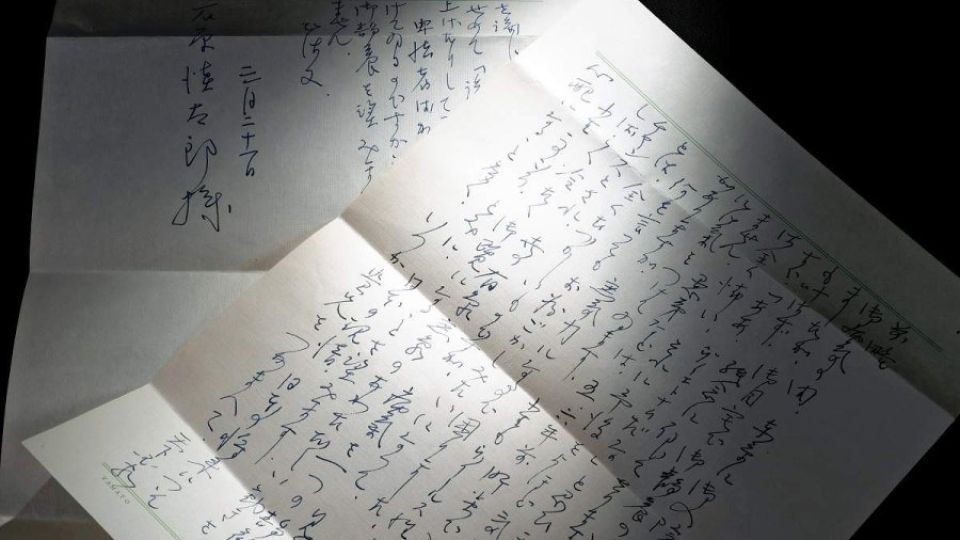February 25, 2025
TOKYO – Six letters from literary giant Yukio Mishima to writer and politician Shintaro Ishihara have been discovered, one of which was a vital factor in Ishihara’s decision to join the world of politics.
The letter that encouraged Ishihara to take that path was sent three years before Mishima (1925-1970) killed himself at a Self-Defense Force garrison in the Ichigaya district of Shinjuku Ward, Tokyo. Ishihara (1932-2022) was active as a young writer at that time.
In later years, Ishihara mentioned the existence of the letters in a book, but they had not been found until now. They were discovered when Ishihara’s family members were going through his belongings.
Mishima wrote a “get well soon letter” in March 1967 for Ishihara, who was receiving treatment for an illness. He clearly wanted to talk to his trusted younger friend, saying: “Recently, I’m often worried about the current situation and the future of Japan. I’m sorry that you got sick just when I wanted to grab you and discuss the country and its politics with you.”
Mishima also said, “I hope you will see your illness as an opportunity to become a silent observer and coolly watch many things happening in this hectic society for a while.”
This advice made a deep impression on Ishihara. In his book published in 1998, he wrote that he decided to become a politician because “the letter got me to close my eyes and contemplate society alone to my full satisfaction during the time I wasn’t writing … and I decided to run for the next House of Councillors election.”
Mishima and Ishihara were on close terms, but they began having different opinions on things. In November 1970, five months before Mishima committed suicide, Mishima published a statement in a newspaper in which he blamed Ishihara for criticizing the Liberal Democratic Party despite the fact that he belonged to the party.
Ishihara expressed his objection to Mishima’s assertions in a newspaper.
Takashi Inoue, a professor of modern Japanese literature at Shirayuri University, who is known for his study on Mishima, said: “What Mishima and Ishihara had in common was their attitude toward writing, as both of them wrote on manuscript paper while viewing the times and the society as their enemy.
“Later, they were opposed to each other over politics and the Emperor, but this is like the phenomenon in which the same magnetic poles repel each other when they are close. These letters are of great significance because they tell us what happened between the two writers.”
Praising Ishihara
“Mishima Yukio Zenshu” (The collected works of Yukio Mishima) does not include any letters from him to Ishihara. All the recently found letters are believed to be new discoveries.
In a letter written in 1965, Mishima highly praised Ishihara’s novel “Hoshi to Kaji” (Stars and helm).
“I was most impressed by the poetic description of the sea … I happily read through the book from beginning to end, as it is a refreshing work of Kaiyo Bungaku (sea literature), which is rare in modern Japanese literature,” he said.
In a letter in 1967, Mishima clearly expressed his expectations for Ishihara, saying, “In the literary world, where cowards are everywhere, you are the only hope for me. So, I want you to take good care of yourself and rest well.”
In another letter, Mishima asked Ishihara’s opinion about including his short story “Machibuse” (Ambush) in an anthology of Japanese literature compiled by Mishima and others and released in English by a foreign publisher in 1972.
As the year 1970 drew nearer, the two men’s opinions began to diverge on matters such as the emperor system. In talks between them in 1969, they could not find common ground. Years later, Ishihara said in an interview that he had almost been killed by Mishima, who had brought a real sword with him.
However, Ishihara respected Mishima until the day he died. In 1991, more than two decades after Mishima’s death, Ishihara published a book titled “Mishima Yukio no Nisshoku” (The eclipse of Yukio Mishima). Ishihara’s belongings include notebooks containing ideas for the book.
In the notebooks, Ishihara drew lines along parts about him written by Mishima, indicating Ishihara had read Mishima’s texts carefully and closely.
According to Ishihara’s fourth son Nobuhiro, 58, Ishihara reread Mishima’s works until his last days. Nobuhiro remembers that his father was in tears thanking Mishima, saying, “He discovered the true writer Shintaro Ishihara.”
In an interview with the publishing company Chuokoron-Shinsha, Inc. in 2010, Ishihara said, “I found Japan dull and boring after Mishima died. If I die, the country will get more boring. Mishima brings back a lot of memories, and I miss him.”
The letters from Mishima to Ishihara will be included in the completed edition of “The eclipse of Yukio Mishima” to be published at the end of this month.

